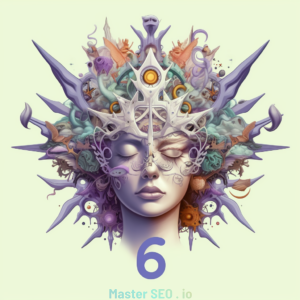
Search engine optimization enhances a website’s visibility and ranking on search engine results pages (SERPs) by optimizing its content, structure, and design to attract more organic (non-paid) traffic.
Understanding search engine optimization
SEO is a complex and ever-changing field that requires technical knowledge, creativity, and strategic thinking. To master SEO, one must understand how search engines work, conduct keyword research, optimize website structure and content, build high-quality backlinks, and monitor and analyze SEO performance. Focusing on these fundamental principles and staying up-to-date on the latest developments can improve website visibility and search engine rankings.
Debunking Common Optimization Myths
You’ll be surprised at what you may have learned that isn’t true
Explore the captivating world of SEO as Jenn Mathews, the SEOGoddess, joined by narrator Annabell Iverson, unveils the reality behind some of the most persistent myths in “Debunking Common SEO Myths.” This video peels back the layers of common SEO misconceptions, clarifying what truly impacts your rankings and what doesn’t.
Some Myths that are Debunked:
- Frequent Content Updates: Contrary to popular belief, constantly updating your page doesn’t guarantee better rankings. Learn why Google’s Rank Transition algorithm could make your frequent updates counterproductive.
- AI-Generated Content: While AI can assist in content creation, it often lacks the nuanced understanding that human expertise provides. Find out how search engines are increasingly skilled at distinguishing and devaluing content that lacks human insight.
- More Links, Better Rankings: It’s not about the number of links. Understand why quality over quantity is better.
Start learning SEO
Learn what SEO does by understanding the intricacies of search engine dynamics, from crawling and indexing to the evolving algorithms shaping search results. Transition into website optimization, navigating architecture, on-page elements, and keyword integration.
Shift focus to the user’s perspective, decoding search queries to tailor content to intent. Simultaneously, master technical SEO, optimizing site structure, speed, and mobile responsiveness. Armed with this foundation, make informed decisions in crafting a content strategy that aligns with user intent and search algorithms.
Embrace analytics for insights into user behavior, allowing continuous refinement of optimization strategies. Your journey, from fundamentals to strategic decisions, is dynamic. Stay attuned to emerging trends, positioning yourself as a curator of a digital experience that resonates with users and search engines.
Discover the freshest insights: Unveiling our latest blog submissions
SEO FAQs
SEO optimizes a website to improve its visibility and ranking on SERPs, aiming to attract organic traffic by making it more relevant and valuable to users. It includes keyword research, website optimization, backlink building, and performance analysis. This improves online presence, attracts relevant traffic, and boosts conversions.
Learn More >>
SEO can bring many benefits to businesses, including increased website traffic, better visibility in search engines, improved brand awareness, higher conversion rates, and a better user experience. It can also be a cost-effective way to attract more customers and grow a business.
Search engines use complex algorithms to determine the ranking of web pages based on various factors, including relevance, authority, and user experience. Some of the most important factors include keyword relevance, website structure and content, backlinks, user engagement, and mobile-friendliness.
SEO has changed significantly over the years, with search engines becoming more sophisticated and emphasizing user experience and quality content. Some of the most significant changes have included the rise of mobile optimization, the importance of social media signals, and the introduction of machine learning algorithms like Google’s RankBrain.
On-page SEO refers to optimizing elements on a website itself, such as content, metadata, and internal linking. On the other hand, off-page SEO refers to activities outside the website, such as link building and social media marketing.
Common SEO mistakes include keyword stuffing, buying links, neglecting mobile optimization, ignoring local SEO, and failing to produce high-quality content. It’s essential to stay up-to-date on best practices and avoid tactics that could result in penalties from search engines.
It can take anywhere from several weeks to several months to see results from SEO efforts, depending on the level of competition and the specific tactics used. SEO is a long-term strategy that requires patience and consistent effort.
Businesses can track and measure the success of their SEO efforts using tools like Google Analytics and Google Search Console. These tools provide insights into website traffic, user behavior, and keyword rankings, allowing businesses to make data-driven decisions and adjust their strategies.
Content is crucial to SEO because it helps businesses attract and engage their target audience. High-quality, relevant content can improve a website’s search engine rankings, attract backlinks, and drive conversions. Content should be optimized for keywords and structured in a way that is easy to read and navigate.
Businesses can optimize their website for local SEO by including their business name, address, and phone number on their website and in online directories, creating location-specific content, and building local backlinks. They should also ensure their website is mobile-friendly and has a clear, easy-to-use interface.
A note from the founder
I want to take this opportunity to explain that this website was created with the assistance of artificial intelligence coupled with the knowledge of experienced SEO professionals such as myself. Suppose you’re skeptical about the quality of the content and the validity behind SEO strategies. In that case, you can visit my LinkedIn and my website to help ease any reluctance you might have. In short, I have over 27 years of experience in SEO, with 15+ of those years in-house with known brands such as Nordstrom, Groupon, and GitHub.
Remember that this site is not the only source you should look at if you want to become a search engine optimization professional. What this site does is help individuals who are interested in a career in SEO to have a basic understanding of search engine optimization and the concepts around SEO. Additionally, there is advice and learning on how to work as a consultant, work within an agency, and help around working in-house and rising up through the corporate ranks.
Started on March 14, 2021, this website was focused on the basics of SEO and is continually updated with new content. The strategies covered are not to be used as the only way to optimize, and no other strategy works. There are many ways to approach SEO, from link building to quality website content and all that is in-between.

This site includes the strategies that have worked for the authors and what they continue to build on as search technologies evolve. You may find someone saying, “That’s not right, you need to do…” or “I find that doing X works better.” which is very common in the search industry and is perfectly acceptable. It’s up to you to take what you learn from this website and other resources and apply it to where it fits you.
By combining these SEO concepts and understanding what other people might attempt to trick the search engines, this site gives you one point of view and a foundation to begin to make decisions on your own
.







